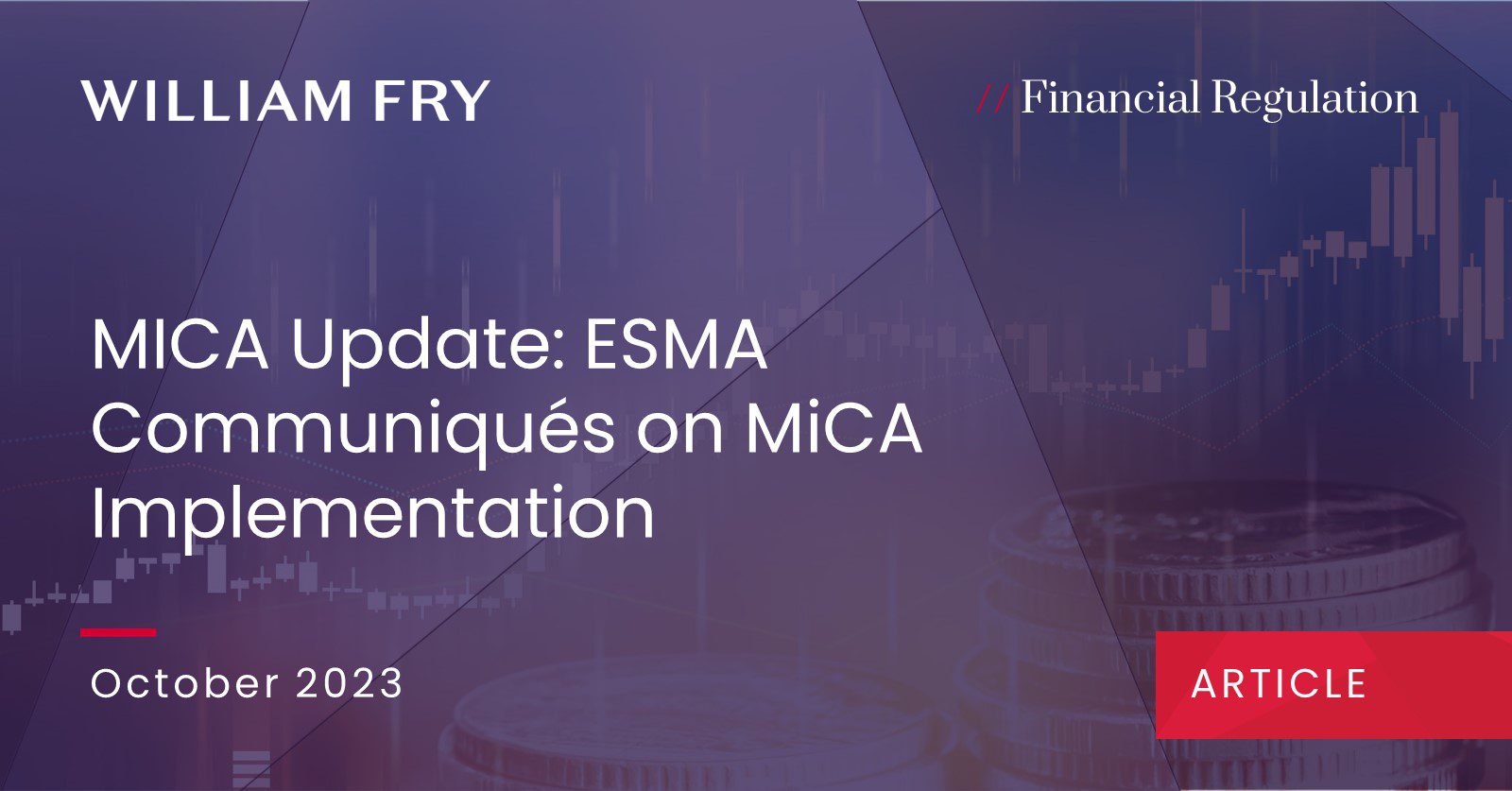On 17 October 2023, ESMA published a letter and statement to encourage Member States, crypto-asset service providers and national competent authorities (NCAs) to act now to ensure a smooth transition to the new EU legal framework for crypto-assets introduced under the Markets in Crypto-Assets Regulation (Regulation (EU) 2023/1114) (MiCA).
We examine these ESMA communiqués and highlight several key points below.
Supervisory Convergence
ESMA wants to ensure a level playing field across EU Member States to minimise the risk of “forum-shopping” by crypto-asset market participants. To this end, in relation to authorisation, ESMA calls on:
- Member States – to designate the NCAs responsible for carrying out the functions and duties required under MiCA and to ensure such designated authorities have adequate powers and resources to exercise their supervisory, investigative and enforcement responsibilities.
- NCAs – to establish supervisory procedures related to the authorisation regimes set out in MiCA, including simplified authorisation procedures for entities already authorised to provide certain crypto-asset services under national law and to foster dialogue with potential applicants as soon as possible.
- Market participant firms – to apply for a MiCA authorisation as soon as possible. ESMA highlights that without a MiCA authorisation, crypto-asset service providers cannot avail of passporting rights within the EU during the transitional period.
ESMA intends to promote coordinated actions on MiCA across the EU by:
- facilitating information exchange between NCAs on authorisation requests and supervisory cases in their jurisdictions;
- encouraging the early convergent application of MiCA rules; and
- consulting with the European Commission to promote a common understanding of MiCA provisions requiring further clarity.
Transition Period
MiCA requirements will apply in full, from 30 December 2024. However, Member States can grant entities already providing crypto-asset services in their jurisdictions up to an additional 18-month transitional period during which they may continue to operate without a MiCA licence. This is commonly known as “grandfathering”. ESMA highlights that this means that holders of crypto-assets and clients of crypto-asset service providers may not benefit from full rights and protections under MiCA until 1 July 2026. In addition the NCA in that Member State will have to rely on the powers otherwise available to them (typically under existing anti-money laundering (AML) regimes, which are less comprehensive than MiCA) for that period.
In the letter from ESMA to the EU Council’s Economic and Financial Affairs Committee, ESMA encourages Member States to consider limiting the optional grandfathering period to no more than 12 months (rather than the maximum optional 18-month period) should they choose to offer it in their jurisdictions.
The Irish Department of Finance issued a public consultation on limited national discretions (including the transition period) under MiCA which closed on 15 September 2023. We await the feedback statement resulting from this consultation.
Actions and reminders for crypto-asset service providers
ESMA’s statement to entities providing crypto-asset services and the NCAs (e.g. the Central Bank of Ireland) that will be responsible for their supervision, sets out expectations for each of the parties from now until the end of the MiCA transition period. To ensure a smooth transition and implementation, ESMA calls on firms currently providing crypto-asset services (including already authorised financial entities) to:
- Communicate transition plans – Inform NCAs and clients of their transition plans as early as possible.
- Clarify regulatory status – Inform clients about the regulatory status of their crypto-assets and/or services they are offering, clarifying whether they are offering crypto-asset services using the grandfathering clause, the type of authorisation they hold, and the country from which they operate. If they are authorised under other sectoral regulations, clarify the regulatory status of the products and/or services they are offering to avoid confusion.
- Align business practices – Align practices to comply with incoming requirements under MiCA to reduce the risk of disruptive business model adjustments.
- Engage with regulators – Engage with NCAs on MiCA’s regulatory perimeter and the application of the new framework to their current activities.
Local laws – ESMA reminds crypto-asset service providers who are active in more than one Member State under local applicable laws that they must continue complying with all applicable local laws until the end of the transitional period.
Reverse solicitation – ESMA highlights that the provision of crypto-asset services or activities by a third-country firm is strictly limited under MiCA to cases where such service is exclusively initiated by the client (i.e. the reverse solicitation exemption). ESMA underlines that reverse solicitation should be understood as very narrowly framed and must be used on an exception basis. ESMA is keen to ensure this exemption cannot be assumed or exploited to circumvent MiCA and notes that it will be subject to further guidance by ESMA.
For further information on MiCA please see our August 2023 update here.
Contact Us
For more information on anything above, please contact Shane Kelleher, Louise McNabola, John O’Connor or your usual William Fry contact.
Contributed by Jane Balfe & Danielle Higgins




